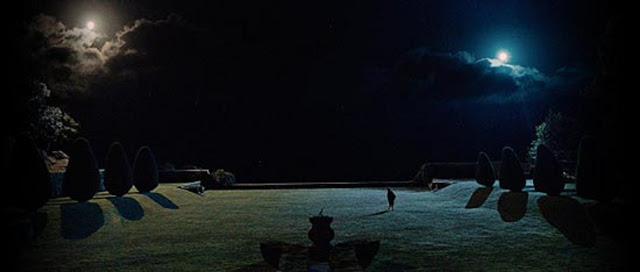MELANCHOLIA peers into the pros and cons of depression. Von Trier, in his upheaval of a press conference at this year's Cannes Film Festival, admitted that he suffers from the disease. As a fellow in this respect, I can tell you that what one depressed individual may find funny is not something to which one who is not depressed can relate. And that's all I'm going to say about that sideshow.
It's seems clear to me, at least, that BOTH of Von Trier's lead characters here suffer from the same affliction. Justine (a transformed Kirsten Dunst) handles the challenge very differently from her sister Claire, played by Charlotte Gainsbourg (both actresses were child stars, which we all know can lead to some serious problems, and I wonder if this is what lead Von Trier to this pairing). Justine is a damaged butterfly; Claire is an overworked beetle. Over the course of the film, the onslaught of a looming companion planet, named Melancholia by soothsaying scientists, threatens our Earth's life. Maybe this is a reference to the pesky global warming debate--will it kill us, or will it not? But fear not, lovelies. This isn't a political film.
Justine's seemingly gilded marriage ceremony is troubled from the start. Flowing gown and all, she has to get behind the wheel of the stretch limo in which she and her husband arrive, attempting to navigate the winding road leading the ridiculously huge mansion where the reception's afoot. Depression is never easy; yep--that snaky road is a metaphor, and an apt one. The incipient celebration is studded with sapping drains on the luminous Justine's energy. She puts up a brave front, because the pressure's on, but her boss (Stellan Skarsgaard) leadens her with work challenges; Skarsgaard's newest assistant (Brady Corbett) sucks at her with a queerly lucrative desperation; her mother (Charlotte Rampling) smashes the party up with her caustic honesty; her lovable but wackadoo father (John Hurt) friskily pockets spoons and pesters the waitstaff for replacements, while forgoing patriarchal responsibilities; her inarticulate new husband (Alexander Skarsgaard) wants most to get on to the honeymoon duties; and Claire is on top of helping Justine navigate this rigamarole, even while Claire's husband (Kiefer Sutherland), from his lofty balcony of logic, sneers at all this cryptic madness.
Enough. It's too much already. Couple this with the upcoming onslaught of the planet Melancholia--which may or may not end the world--and, inevitably, the idea of happily-married bliss becomes absurd for Justine. MELANCHOLIA is split into two pieces, each named after the two sisters, and by midfilm, when the siblings are taking a galloping horse ride through the foggy countryside, past all the frivolous golf courses, Justine is the with-it one who notices treasured stars in the sky have disappeared behind that ever-approaching threat.
The second half of Von Trier's newest and possibly most accessible (but still resolutely strange) tale follows Claire as she tries to make more down-to-earth sense of Melancholia's approach. She has a young son to worry about, and father Sutherland is too bent on showing their boy the planet's progress--via telescope and a more illustrative homemade device--to even address the larger implications of this event; in fact, he denies any implications until it's too late. In the end, it is the seemingly delicate Justine who's a bulwark of strength, even though at the beginning of this episode she's so overfunked she can barely take a bath. As a treat, Claire cooks Justine her favorite meal--a homey meatloaf--and even this fails to cheer her. "It tastes like ashes" a crestfallen Justine says. For me, this was MELANCHOLIA's height; nothing says more about the experience of depression than being presented with a former joy, whatever it might be and then, because you just can't help it, feeling yourself spit that fleshly gift right back into the faces of people you love.
Being depressed is like feeling the world implode each and every day. Justine knows this, and she needs relief. But she also suspects--no, is certain--she's correct in feeling this way. You'd have to be crazy not to (maybe this IS a political film--it equalizes the 1% and the 99%). So it's not surprising Justine's the one best equipped to handle an end-of-the-world scenario; it's possibly the only time being depressed would actually be a plus. For "sane" Claire, the world ends before it really ends, and you realy feel sorry for her because she's tried hard to smooth out all of life's wrinkles. But for the more unfettered Justine--a once fresh-faced but now sunken-eyed goddess--this radically troubled globe deserves its fate, so saying a lyrical goodbye is not at all hard to do. There haven't been many movies made about depression so it strikes me as doubly pleasant that MELANCHOLIA gets the downtrodden spirit so artfully right without smushing your puss into a batch of whiny speeches. It's a puzzle, but what a kooky beauty it is, this blanket of misery.




3 comments:
Wonderful! As Kiefer's character might say..."Unbelievable..."!
(So funny everytime he says it.)
Your review and the movie are both perfect and exquisite, and I also really appreciate the insight into the depressive state of mind that informed both. It might be that anyone who steps differently through this world has a little of the depressive in him or her, and if it helps one face the inevitable end, I'm for it.
Lovely review and I think this is a movie that needs to be watched several times. I know I will be!
Love this movie even more than TREE OF LIFE this year (although I should give that one a second look before I draw up any kind of 2011 list). I bring up Malick's film because I think they would both make up a wonderful, epic, perverse double-bill.
Indeed, Tony! A double-bill of THE TREE OF LIFE first and MELANCHOLIA second would be superb! It literally would say it all.
Post a Comment